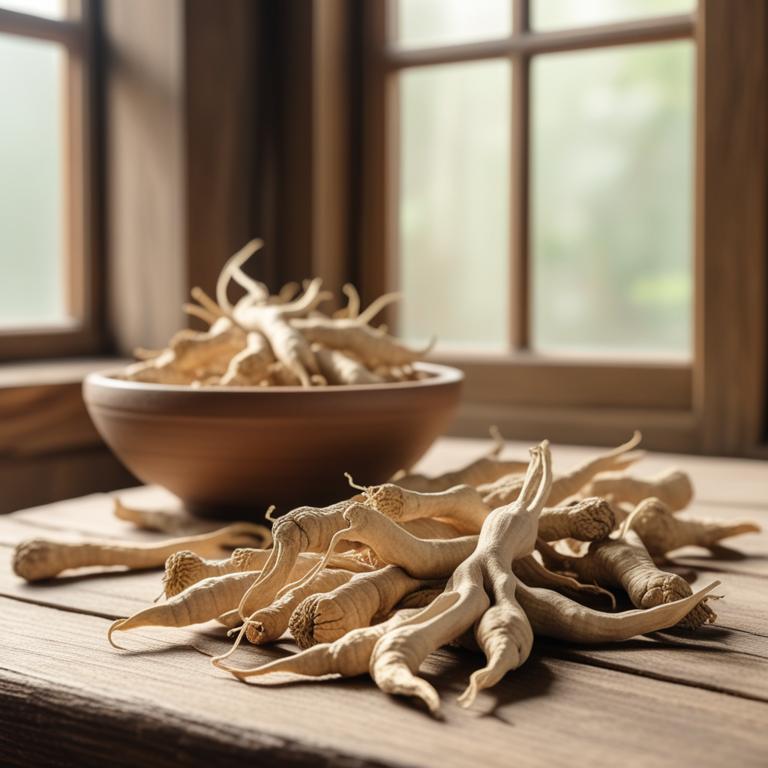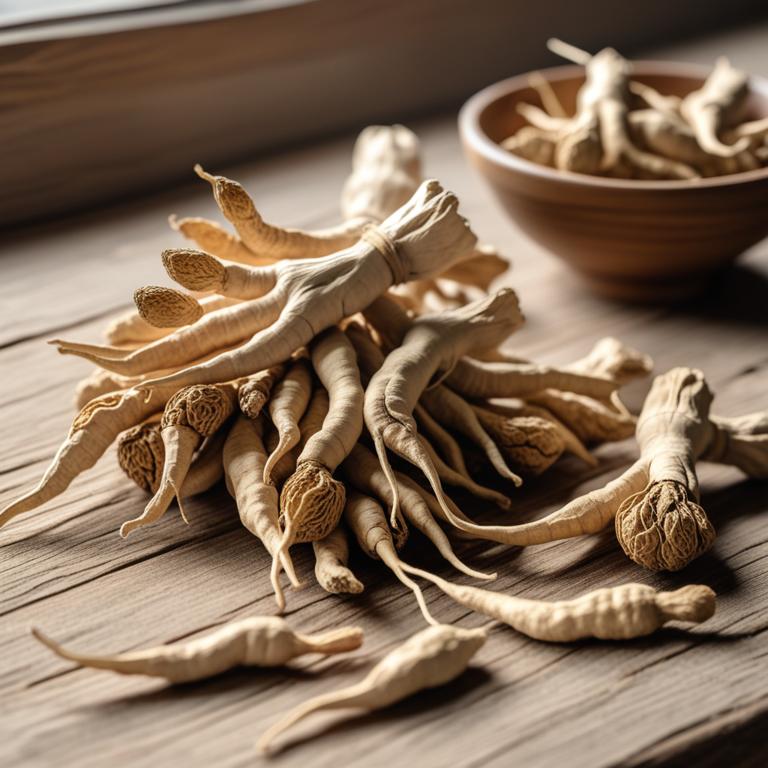Updated: Dec 1, 2024
Nerve Pain and Herbal Preparations: Understanding Causes and Natural Relief

Nerve pain, also known as neuropathy, is a type of pain that occurs when nerves are damaged or inflamed.
It can cause a burning, tingling, or stabbing sensation in the hands and feet, making everyday activities like walking or even holding objects a challenge. Nerve pain can be caused by diabetes, injuries, infections, or even certain medications. It's a condition that can disrupt your life, making it difficult to sleep, work, or even enjoy simple pleasures. Herbal remedies have been used for centuries to alleviate nerve pain. Turmeric, with its active compound curcumin, has anti-inflammatory properties that can help reduce swelling and ease pain. Ginger, another popular herb, has warming properties that can help relax tense muscles and calm the nervous system.
Ashwagandha, an adaptogenic herb, can help the body adapt to stress and promote relaxation. When consumed as a tea, these herbs can be absorbed into the bloodstream, providing relief from nerve pain. You can prepare these herbal remedies in various ways. For turmeric, try making a golden milk tea by mixing turmeric powder with warm milk and a pinch of black pepper. For ginger, steep fresh ginger in hot water to create a soothing tea. Ashwagandha can be consumed as a tea or capsule.
You can also add these herbs to your meals or smoothies for added benefits.
Table of Contents
What leads to the development of nerve pain?
The main causes of nerve pain are conditions that put pressure on or damage the nerves.
One major cause is diabetes, a disease that affects blood sugar levels and can damage nerves over time. This nerve damage is often referred to as diabetic neuropathy. Another cause is a herniated disk, which is when a disk in the spine bulges out and presses on a nerve. This can cause pain, numbness, or tingling in the affected area.
Multiple sclerosis is another condition that can cause nerve pain, as it affects the protective covering of nerves, leading to damage and pain. Shingles is a viral infection that causes a painful rash and can lead to nerve pain. It occurs when the varicella-zoster virus, which causes chickenpox, reactivates and affects the nerves. Carpal tunnel syndrome is a condition that affects the wrist and can cause nerve pain, as it puts pressure on the median nerve. Lastly, a pinched nerve can cause pain and numbness.
A pinched nerve occurs when a nerve is compressed or pinched by surrounding tissue or bone, often due to injury or repetitive motion.
What are the benefits of using herbs to heal nerve pain?
Using herbs for nerve pain can be a natural and effective way to find relief.
One of the main benefits is that these herbs can help reduce inflammation and pain in the nerves. They can also calm the nervous system, which can help with anxiety and stress that often accompany nerve pain. Some herbs have anti-inflammatory properties, which can help reduce swelling and discomfort in the affected area.
Others can help improve blood flow to the nerves, which can aid in healing and reduce pain. Additionally, many herbs have antioxidant properties, which can help protect the nerves from damage and promote overall health. By using these herbs, people may be able to reduce their reliance on medication and find a more natural way to manage their nerve pain.
They can also be used in combination with other treatments, such as physical therapy or acupuncture, to provide even more relief.
Which herbs are commonly used in medicine for nerve pain?

Herbs have been used for centuries to help manage nerve pain, and many of them are still effective today.
One of these herbs is Capsicum annuum, commonly known as cayenne pepper. It contains a chemical called capsaicin, which blocks the production of a chemical called substance P that transmits pain signals to the brain. By blocking these signals, cayenne pepper can help reduce nerve pain. Another herb that's been used to help with nerve pain is Zingiber officinale, or ginger. Ginger has anti-inflammatory properties that can help reduce swelling and pain in the nerves. It also contains a chemical called gingerol, which can help block the production of substance P, similar to cayenne pepper. Turmeric, or Curcuma longa, is also a good option for nerve pain. It contains a chemical called curcumin, which has powerful anti-inflammatory and antioxidant properties.
Curcumin can help reduce swelling and pain in the nerves, and it can also help protect the nerves from damage. Passiflora incarnata, or passionflower, is a herb that's often used to help with anxiety and insomnia, but it can also help with nerve pain. It contains a chemical called harmine, which can help reduce pain and inflammation in the nerves. Acorus calamus, or sweet flag, is another herb that's been used to help with nerve pain. It contains a chemical called asarone, which can help reduce pain and inflammation in the nerves. Asarone can also help relax the muscles and reduce tension, which can help alleviate nerve pain. All of these herbs can be used in different ways to help manage nerve pain. They can be taken as supplements, used in teas or infusions, or applied topically as creams or ointments.
It's always a good idea to talk to a healthcare professional before using any new herbs, especially if you're taking medications or have underlying health conditions.
What are the most commonly used herbal remedies for nerve pain?

Herbal preparations can be a helpful way to manage nerve pain.
A tincture is a liquid extract that can be taken in small amounts under the tongue. This allows the active ingredients to be quickly absorbed into the bloodstream, providing fast relief from nerve pain. Capsules contain dried herbs that are easy to swallow and provide a consistent dose of the active ingredients.
Decoctions are liquid extracts made by steeping herbs in hot water, and can be taken as a tea or added to other drinks. This method is especially helpful for herbs that are difficult to extract, like roots and bark. Herbal creams and salves can be applied topically to the affected area, providing localized relief from pain and inflammation.
These topical preparations can be especially helpful for people who have difficulty swallowing or prefer to avoid taking oral medications.
Additional Resources:
What herbs are contraindicated for individuals suffering from nerve pain?
If you're experiencing nerve pain, there are certain herbs you should steer clear of.
Ginkgo biloba, for example, can make nerve pain worse because it can stimulate the nervous system, which may not be what you need when you're already feeling sensitive. Ephedra sinica, on the other hand, is a stimulant that can increase heart rate and blood pressure, which can further irritate your nerves.
Cinchona officinalis contains quinine, a compound that can be toxic to your nervous system if taken in excess. Rauvolfia serpentina, also known as Indian snakeroot, can cause nerve damage and worsen nerve pain due to its active compounds. Angelica archangelica can be problematic as well because it can stimulate the nervous system and increase blood pressure, which may not be suitable for people with nerve pain.
These herbs may have potential benefits for other conditions, but for nerve pain, it's best to avoid them and try other, more gentle remedies.
FAQ
Are there any specific herbs that can prevent nerve pain?
Ginger is known to help with nerve pain.
It contains compounds that reduce inflammation and block pain signals. Turmeric, with its active ingredient curcumin, also has anti-inflammatory properties that may ease nerve discomfort.
Both ginger and turmeric have been used in traditional medicine to soothe nerve pain, but their effects can vary from person to person.
Is it safe to use herbal remedies for nerve pain during pregnancy?
If you're experiencing nerve pain during pregnancy, it's best to use herbal remedies with caution.
Some herbs, like ginger and turmeric, have anti-inflammatory properties that may help soothe nerve pain. However, others like feverfew and blue cohosh may not be suitable due to potential risks to the fetus.
Always check the ingredients and dosage before using any herbal remedy.
Are there any herbs that can reduce the frequency of nerve pain?
Turmeric contains a compound that may help reduce nerve pain by blocking a chemical that sends pain signals.
Ginger has anti-inflammatory properties that can also help ease nerve discomfort.
Some people find that taking these herbs regularly can decrease the frequency of nerve pain episodes.
Can i combine different herbal remedies for nerve pain?
You can combine different herbal remedies for nerve pain, but be cautious of potential interactions.
For example, combining ginger and turmeric might enhance their pain-relieving effects, but using ginger with blood thinners could increase bleeding risk.
Monitor your body's response and adjust your combinations accordingly to find what works for you.
Related Articles

Tinnitus: Understanding the Causes and Natural Remedies

Migraine: Understanding the Causes and Herbal Remedies

Breaking Down Depression: Causes, Symptoms, and Herbal Remedies

Hiccups: Exploring the Reasons and Herbal Solutions

Chills: Understanding the Causes and Herbal Preparations for Treatment






